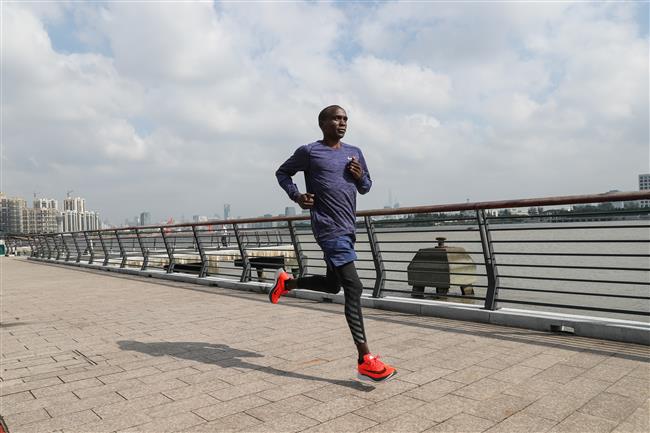Kipchoge sets sight on marathon world record

Olympic gold medalist Eliud Kipchoge is in Shanghai to share his experience with local long-distance runners and coaches.
Olympic gold medalist Eliud Kipchoge said his next goal is to challenge the marathon world record.
The Kenyan star was in Shanghai over the weekend to share his experience with local long-distance runners and coaches.
“My next goal is to challenge the marathon world record,” said the 32-year-old. “It’s important to keep giving yourself new targets, and then just keep running.”
The IAAF world record for men is 2 hours, 2 minutes and 57 seconds, set by fellow Kenyan Dennis Kimetto on September 28, 2014, at the Berlin Marathon.
Kipchoge gained early fame over the middle distance, winning 5,000-meter medals at the world championships and Olympics. He began moving towards road running in 2012. In 2016, he had his personal-best time — 2:03.05 — at the London Marathon, which was followed by a gold medal at the 2016 Rio Olympic Games in a time of 2:08.44.
On May 6, 2017, as part of the Nike Breaking2 project, he ran a marathon distance in 2:00.25 at Italy’s Monza race track, though it was not recognized as an official world record.
“I think there are limits for a human being (to complete the 42km marathon distance), which is between 1:58 and 1:59. I think I can run within 1:59 some day,” said the Kenyan. “Right now I’m at a point where there is balance between physical conditioning and experience. Confidence is crucial when you challenge your limits. Also, you need passion and talent.”
Kipchoge, who runs 200-230 kilometers per week as part of his training regime, also revealed the secret behind his consistent good results in marathons — keep smiling.
“Marathon is tough, but when you try and keep yourself happy during the competition, your brain will accept that. And when it comes to the last few kilometers, this will make a difference,” said Kipchoge.















